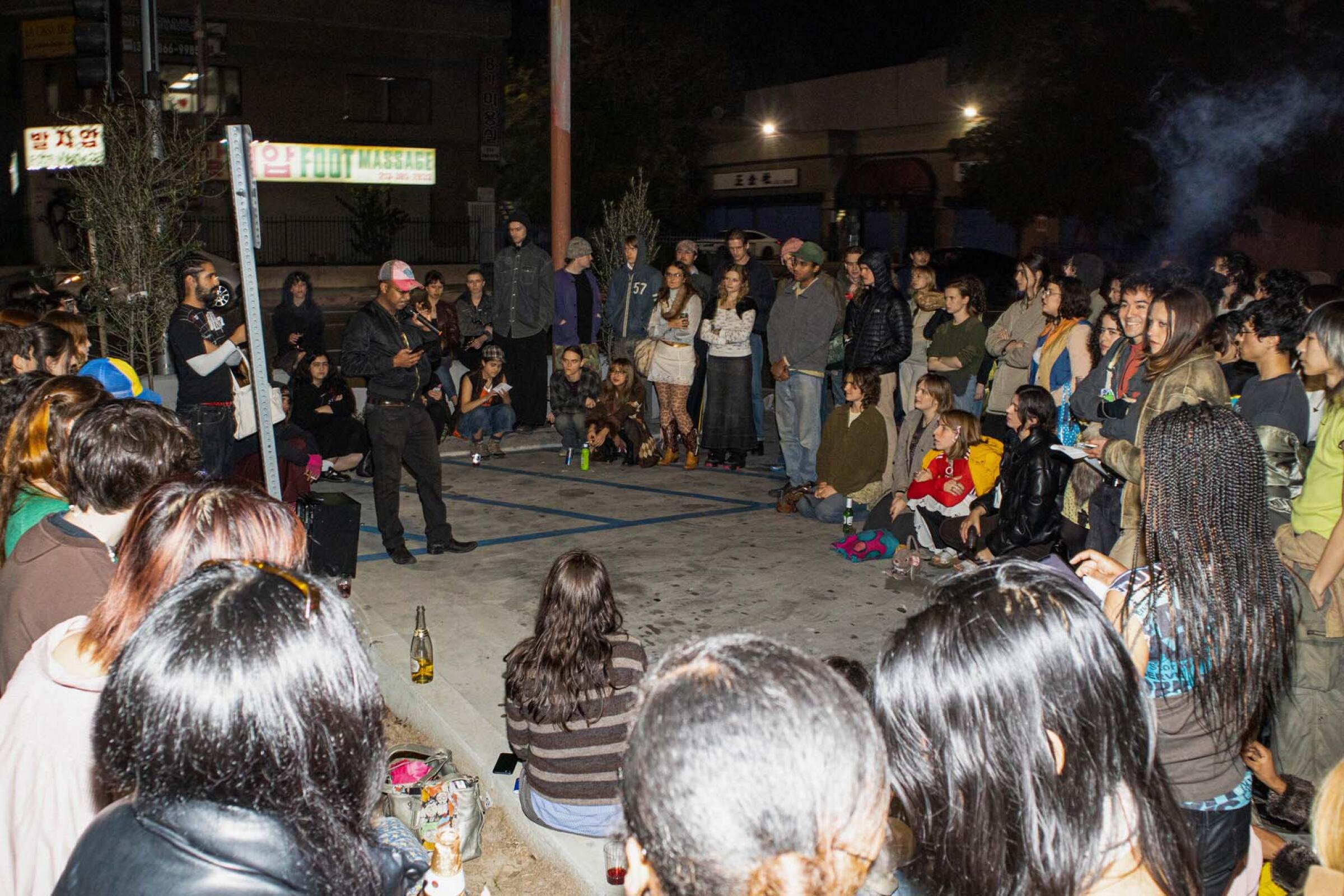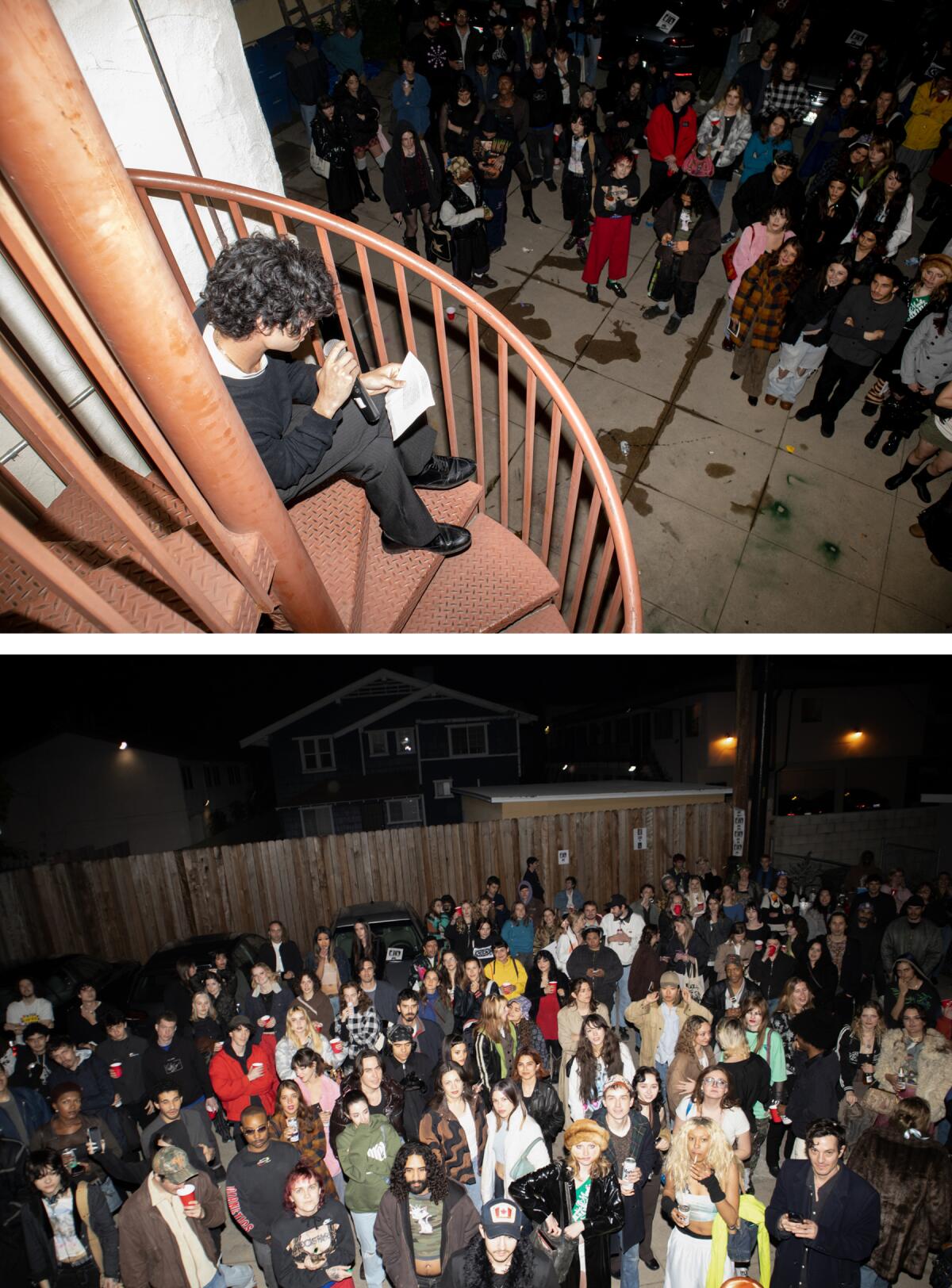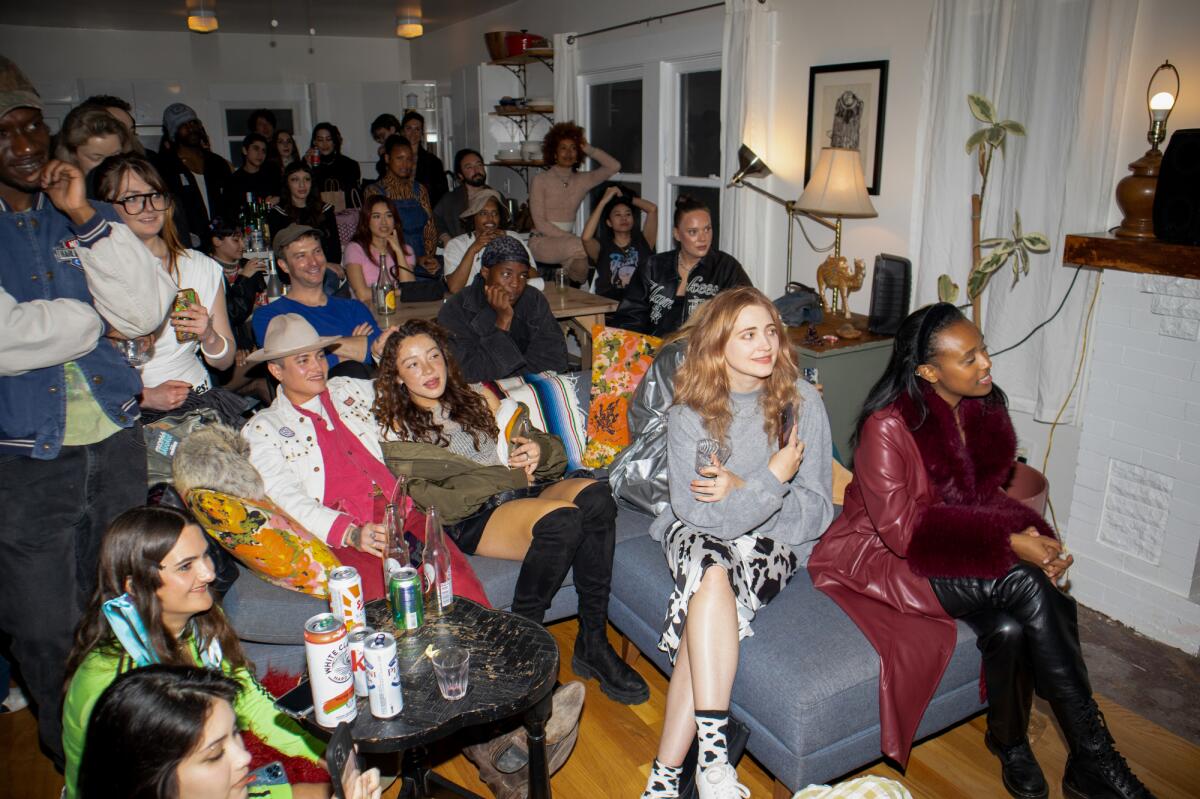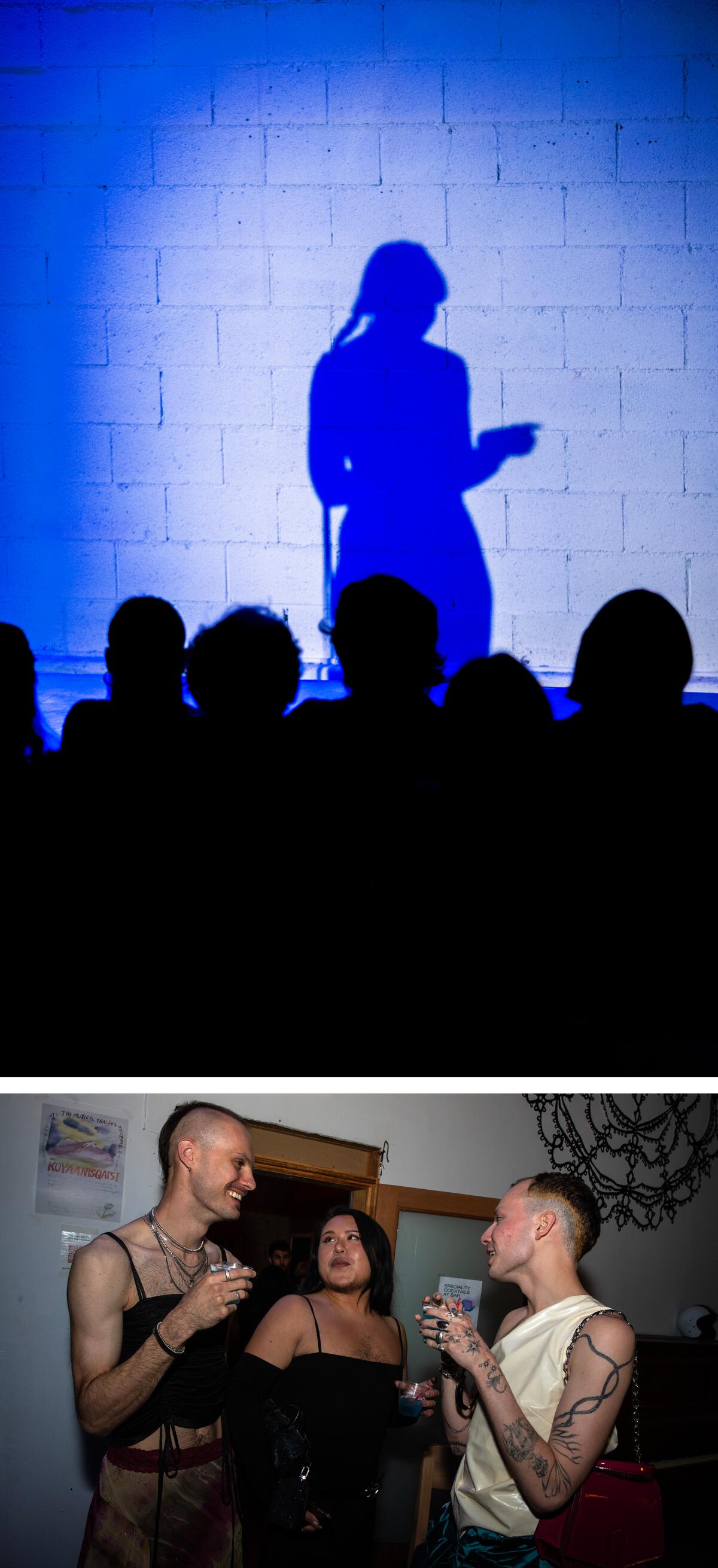Sign up for The Wild
We’ll help you find the best places to hike, bike and run, as well as the perfect silent spots for meditation and yoga.
You may occasionally receive promotional content from the Los Angeles Times.

The reading was more of a house show in more of an uncovered garage. Nitrous-filled balloons and chaos-theory fashion dotted the buoyant crowd, who treated the writers as rock stars, and the literary event turned out more of a parenthesis than the main point, which was to party.
At Factory Made, an emergent reading series named after Andy Warhol’s star-making studio, theatrics and personae count as much as poetry and prose. “Surprise: I’m hot too,” said Kennedy Wright during a midshow outfit change that she called “JT LeRoy meets ‘8 Mile’ meets Frappuccino” at a spring show.

Factory Made’s creator, Jasmine Johnson, likes the vamping and banter. It’s the lifeblood of the series she billed as a “cross-genre pollination” of Gen Z multihyphenates, injected with an underground tenor she’s picked up at raves and art shows. “Everyone’s low-key a writer,” said the 24-year-old native Angeleno.
Her lineups have included a rapper’s screenplay, autofiction about a transgender woman’s improbable pregnancy and a meth-driven emergency room play-by-play. In another life, she said, she’d be in public relations. Her first show in January was an improvised takeover of Pollo a la Brasa’s parking lot in Koreatown after her studio apartment’s manager kicked out the 100-person horde.
“I’ll say I’m doing a reading, and people will get confused and ask, ‘Like a palm reading?’” Johnson said.
L.A.’s myths are more cinematic than bookish, but Johnson is part of a creative underclass revising the L.A. literary scene writ large. Forged in urban sprawl and COVID-19, guerrilla readings pop up in unexpected spots like vacant spaces, living rooms and rooftops, adding a DIY frisson to nightlife. These free events and their offshoots are happening nearly every night of the week — and sometimes they inspire attendees to start their own.
“It’s the new virus,” said Anika Levy, whom, along with Madeline Cash, those in the know credit with starting the new literary trend in October 2020 at Hollywood Forever Cemetery. More people showed up than expected to their event, and Hollywood Forever banned them for being too rowdy. But their puckish, low-stakes experiment took off with more outdoor readings and a glossy print publication: Forever Magazine. Lockdown engendered the internet era’s revival of zine and small-press self-publishing, but Cash saw a white space in the splintering literary movements; she imagined readings as localized fandom, not hostage situations.
From Griffith Observatory to Olvera Street to Lake Balboa Park, Los Angeles is filled with great places to read, each with its own literary mood.
Levy, 28, and Cash, 26, both grew up in the San Fernando Valley but decamped to New York last year for more opportunities in publishing. They’ve tried to keep their “dumb blond” energy while abiding by “the principle that readings aren’t necessarily for writers,” Levy said.
Safe from publishing’s “institutional chokehold,” the co-editors traded on this new genre of literary “It” girl and a reputation for huge turnouts at their events. Clubs that normally cost $15,000 to rent have given Forever Magazine space in exchange for a bar commission. Last year, they celebrated issue No. 3 on the rooftop of the Ace Hotel in downtown L.A., and for Angeleno author Allie Rowbottom’s debut novel, “Aesthetica,” about plastic surgery and social media addiction, the Forever team supplied the book party with photographer Mark Hunter, a.k.a. the Cobrasnake, and free Botox.
“That a serious writer has to reject popular culture and be an agoraphobic alcoholic is of the past,” said Cash, adding that an author modeling for fashion designers or borrowing an $800 dress for a reading is as much a part of the narrative-building as writing itself.

Before the pandemic, Sammy Loren struggled to find a social component to his writing. “I was always envious of the way in which the art world had this built-in social life,” he said. He’d go to readings at legacy bookshops and his eyes would roll back in his head, and then everyone would disappear right after.
While living in Mexico City, he fell in with a thriving literary circuit divorced from cultural establishments, where poetry groups held court on street corners and in back alleys. Loren returned to L.A. in 2021 and hosted an ersatz dinner-party salon that spun off into Casual Encountersz, “readings of rage and romance” at his house, or anywhere really. “I always try to introduce myself to everyone that comes,” he said. The 38-year-old seized a rhythm between the “manic Gen Z voices” and his “geriatric millennial peers,” like the night he paired Jasmine Johnson’s stream-of-consciousness drug confessions with Jeffrey Deitch gallery director Melahn Frierson’s college diary sexcapades.

To Halleta Alemu, 30, Casual Encountersz represented a second chance at the writing life she didn’t know existed. Emboldened by this brave new world, she went up to Loren after a show to ask if she could read at his next one. “He was like, ‘Yeah, totally,’” Alemu said. Outside a Highland Park carnicería with folding chairs and beer coolers, Alemu read her pink-papered poems. “It made me consider why I never felt connected with writers circles,” she said. She had spent nearly a decade working as a model and actor but finally envisioned herself as a writer who lived off the page. Soon, though, she sensed a familiar system of power and privilege and thought, “I can’t do this again.”
This time, she wouldn’t wait to be discovered. “I wasn’t going to climb more ladders presented to me,” she said. “I don’t need them now because I know it’s all a scam.” She started a Substack, self-published a paperback booklet known as a chapbook and began her own reading series called Electric Blue, a hybrid of her party life and creative practice. “I want to have a profound experience, but I also want to have fun,” she said.
The 95 contributors to our Ultimate L.A. Bookshelf agreed on many essential books. Here are the 26 best of the best, each receiving at least 7 votes — ranked

Electric Blue is a sleeker affair. The first was held in a downtown loft with disco balls and live DJs among influencers and poets and influencer-poets; she served Gia Coppola wine and Sanzo sparkling water. At her latest, after the writers and artists performed, Alemu and a fellow actor wore matching black bodysuits and recited, as one, a soliloquy of racing thoughts before bed against trippy video visuals and ambient noise. “People take risks to see musicians, even visual artists, but they don’t really take the risk to see writers,” Alemu said. “Why can’t a writer have the allure and mystique and the world-building of a pop star?”
A parallel plot is playing out between small businesses and indie presses. Last month, the Dry River zine from Gen-Z-run Crybaby Press threw a release party and reading at the Chinatown wine bar Cafe Triste, while the Quarterless Review, a risograph-printed lit magazine from Tiding House, co-hosted a poetry-meets-comedy variety show in Night Gallery’s courtyard with the Erogenous Zone.
Bookstores and cafes work best with this kind of cross-promotion, particularly ones that operate as both. Stories Books & Cafe in Echo Park has always baked events into its business model, especially to attract evening customers, said co-founder Claudia Colodro. Book sales perk up depending on the author and audience, she said, but the cafe enjoys the lion’s share with coffee, beer and wine sales.
Colodro said event nights on their patio have flourished post-pandemic, thanks to events coordinator Chris Molnar, who’s also publisher of Archway Editions, the literary imprint of powerHouse Books (distributed by Simon & Schuster). Archway’s online editor, Caitlin Forst, based her reading residency NDA on the autofiction anthology she edited last year and has brought out marquee authors like Ottessa Moshfegh, Chris Kraus and Jonathan Ames. Molnar and Forst both moved here from New York in 2021, eager to mine the “untapped reserve” of young and “unpublishable” writers in L.A.
“The writers who live in L.A. have a better grasp of performance,” Molnar said. “I think it’s a generalization that can be made because it’s something you’re around more out here.”
In March, Miranda July headlined NDA’s standing-room-only reading on Stories’ patio. The soft-spoken writer-director told the admiring audience that she agreed to Forst’s DM request partly because it was the same date as her book deadline. The motivation worked, and she read the first chapter of her forthcoming novel from a heavy-set manuscript.
Jasmine Johnson read that same night among author-celebrities like July, Robert Glück and Michelle Tea. She ran into the crowd 30 minutes late and sat on the floor until it was her turn, rattling off flash fiction with the fluent vim and vigor of a pharmaceutical commercial’s legal disclaimer. It was funny, transgressive, absurd — and she knew it.
“I wonder what it’s like to OD,” she read. “Oh wait, been there, done that, and I got a book deal out of it. Thanks, Archway!”
Updates
5:37 p.m. May 18, 2023: This post has been updated to note that the poetry-meets-comedy variety show at the Night Gallery was co-hosted by the Quarterless Review and the Erogenous Zone.
Sign up for The Wild
We’ll help you find the best places to hike, bike and run, as well as the perfect silent spots for meditation and yoga.
You may occasionally receive promotional content from the Los Angeles Times.